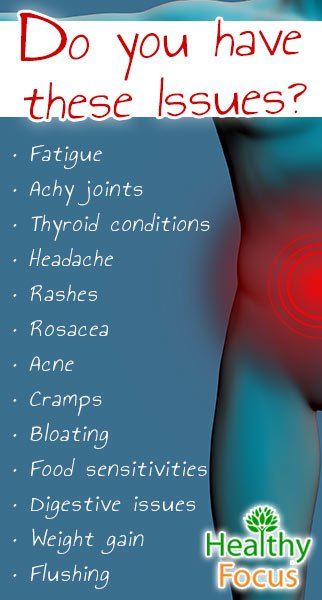Last Updated on February 24, 2019 by Marc Seward
You may not be familiar with Leaky gut syndrome just yet, but it has slowly been gaining more attention. In fact, millions may be suffering from it and may not even know it. Leaky gut syndrome attacks the digestive system and may lead to other health complications.
Some people may not realize they are suffering from leaky gut syndrome and may chalk up their symptoms to food allergies.
Leaky Gut Syndrome
So what is leaky gut syndrome? Leaky gut syndrome is where the digestive tract lining is damaged and things start to go awry. Our digestive tract serves as a barrier, only letting certain small substances through, preventing larger, harmful substances from getting through. Naturally, your digestive tract is riddled with little holes that lets these substances through.
However, when you have leaky gut syndrome, the holes become enlarged and start letting larger, more harmful substances and particles through. The digestive tract is no longer working as an effective barrier as its letting toxic waste, undigested food, and even viruses and bacteria through. Once these harmful substances slip through your digestive system, they leak into your bloodstream and get travel throughout the rest of your body, causing your immune system to go haywire.
As if that’s not bad enough, while your digestive tract is busy letting harmful substances through, absorption of nutrients may be compromised, which can lead to nutritional deficiencies.
Symptoms of Leaky Gut Syndrome
When harmful substances enter your blood stream and are transported through your body, your immune system has a tendency to get upset, resulting in several inflammatory responses. If you suspect that you are suffering from leaky gut syndrome, you may have some of the following symptoms:
• Fatigue
• Achy joints
• Thyroid conditions
• Headache
• Rashes
• Rosacea
• Acne
• Cramps
• Bloating
• Food sensitivities
• Digestive issues
• Weight gain
• Flushing
If Left Untreated
If leaky gut syndrome is left untreated, it can lead to further health complications. A damaged digestive tract can lead to irritable bowel syndrome, inflammatory bowel disease, chronic fatigue, arthritis, muscle pain, eczema, psoriasis, migraines, depression, and anxiety.
There is some research indicating that suffering from leaky gut syndrome may lead to severe autoimmune diseases, such as Type 1 diabetes. Another result of leaky gut syndrome is the denial of vital nutrients and minerals to your body. Leaky gut syndrome leads to a damaged digestive tract, especially the portion that absorbs vitamin B12, iron, and zinc.
Causes of Leaky Gut Syndrome
Currently, there are four main culprits suspected in causing leaky gut syndrome.
Diet: First and foremost, what you’re putting into your body can be causing serious damage. Foods such as sugar, GMO’s, dairy, and unsprouted grains can be causing damage to your digestive tract. These foods damage your gut encourage the growth of bad bacteria and make digestion difficult.
Toxins: Modern life makes it difficult to escape the exposure of harmful toxins; some of these toxins may even be responsible for causing your leaky gut. These toxins may be tap water, pesticides, aspirin, anti-inflammatory drugs, and antibiotics.
If your tap water is your problem, purchase a water filter to skim out those harmful toxins. Aspirin can be substituted with natural herbs to treat headaches, achy joints and muscles, etc.
Stress
Stress literally affects every facet of your body, overtaking your health like a giant wave. Being chronically stressed out compromises your immune system, making it difficult to fight off viruses and bacteria, resulting in inflammation throughout your body and an awful leaky gut. Make calming down a priority: get more sleep, get some exercise, practice yoga, do breathing exercises, meditate, whatever you got to do to relax.
Bacteria
When there is an overabundance of bad bacteria in your gut and minimum of good bacteria, many problems can result, particularly a leaky gut. Many things can cause this imbalance, such as taking antibiotics or drinking water that contains vast amounts of fluoride and chlorine. Fortunately, you can help reverse this imbalance by taking a probiotic or eating probiotic rich foods.
Treating Leaky Gut Syndrome
Leaky gut syndrome is a pretty invasive condition, dramatically affecting the quality of your life. The good news is, there are steps you can take to help heal your leaky gut and to take your health back. By following the four steps listed below, you will be able to get your digestive system back on track.
1. Remove Harmful Foods and Substances
The first step of healing your leaky gut is to remove all the harmful foods from your diet. Removing sugars, yeast, dairy, meat, soy, gluten, caffeine, and alcohol can give your overworked and damaged digestive system a much needed break.
Filtering your tap water and avoiding pesticides, anti-inflammatory drugs, and antibiotics is also important. Talk to your doctor if they have prescribed antibiotics and anti-inflammatory drugs before considering removing them from your daily routine.
2. Enjoy a Healthy Gut Repairing Diet
Replace all the harmful foods listed above with nice, gut healing foods. By eating probiotic-rich foods such as fermented veggies, you can help balance the good bacteria in your gut. Some fermented veggies may include sauerkraut and kimchi.
Getting enough fiber is also vital to your digestive health by encouraging the growth of good bacteria. You can get your daily dose of fiber from steamed veggies, fruit, chia seeds, flaxseeds, and hemp seeds. Its been mentioned that dairy can negatively affect your digestive tract, this is true, however, raw cultured dairy may actually provide a benefit and help heal your leaky cut.
This specific kind of dairy contains probiotics that help encourage the growth of good bacteria in your gut. Raw cultured dairy may include raw cheese, yogurt, and kefir. The same goes for meat; there are some kinds of meat that are actually good for your digestive system and health. Meat high in Omega-3s serve as a great anti-inflammatory. These meats include wild-caught salmon, lamb, and grass-fed beef.
3. Repair Digestive Tract
Taking nutritional supplements will not only help repair your gut, but will also help replace the nutrients lost while suffering from leaky gut syndrome. Taking digestive enzymes before each meal will help fully digest all of your food, decreasing the chances of undigested particles getting through damaged digestive lining. To heal damaged digestive lining, take glutamine powder.
This will help repair damaged cells and protect your digestive tract from further damage. Licorice root encourages the production of essential stomach acid and helps balance cortisol levels. Licorice root also help protect the lining of the stomach and is especially recommended for people whose leaky gut is the result of stress.
Last, but not least, quercetin is essential to sealing the gut and encouraging the barrier function of your digestive lining. Quertin also inhibits to release of histamines, which causes the allergic inflammatory response to certain foods.
4. Rebalance Gut Flora
Taking a daily probiotic will help restore good bacteria and keep everything balanced. By eating a probiotic-rich diet AND taking a daily probiotic, you will help repair your leaky gut and prevent the syndrome from coming back.
Getting enough probiotics is essential to your health because it not only aids in digestion, but it also helps keep your immune system running smooth, which is vital to fighting the infection caused by bad bacteria and viruses.


Leave a Reply
You must be logged in to post a comment.